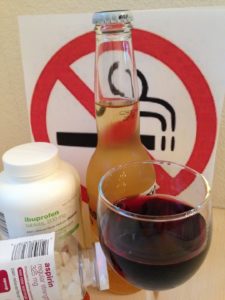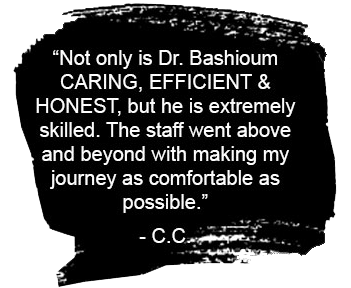Top 10 Tips for Cosmetic Surgery Recovery
January 24th, 2017
After more than thirty-five years as a Board Certified Plastic Surgeon, I have identified my Top-10 Tips for Cosmetic Surgery Recovery. Patient preparation for surgery is essential to assure that the post-operative course of recovery is easier and safer for our patients. I can’t stress more strongly the importance of patience responsibility in regard to these instructions. Following these guidelines can significantly reduce both pain and the risk of complications. Here are my Top 10 recommendations for our patients, although it is important for any patient to follow whatever instructions their chosen surgeon provides. Surgery by and large is safe. Complications are always an inherent risk, however you can help in reducing post-operative risks by observing these simple tips before and after surgery.
- Stop all aspirin and NSIDs. Both of these drugs affect platelet function in the blood. The result is a reduced ability to clot the blood when tissue is divided in surgery. This can lead to unwanted bleeding and bruising after surgery. These effects last for two weeks. Stop taking these medications two weeks before surgery.
- Take A Shower. Any time you shower, the number of bacteria on the skin is reduced. Taking a shower the night before and the morning before surgery can go a long way in reducing the risk for infection. Regular soap is fine for the task.
- No Food or Liquids Before Surgery. Eating solid food before surgery is dangerous. It can lead to vomiting during surgery that can result in aspiration. Aspiration pneumonia is very serious and can result in death. Always know the recommendations regarding how long before surgery you need to stop eating and drinking liquids, generally it is 8 to 12 hours before surgery.
- Avoid Health Store Medications. Unfortunately, natural medications can be variable in preparation and strength. Some of them lead to unsafe increased blood pressure during surgery. Excess intake of some vitamins can interfere with clotting. For this reason, consider only taking a single multivitamin for two weeks before surgery. Stop taking other over the counter medications directed by your surgeon. Continue taking prescription pills, as directed by your physician. Make sure you tell your surgeon and your anesthetist all the drugs you have been taking before anesthesia and surgery.
- Stop All Illicit Drugs. Illicit drugs can be dangerous. Their formulation and content is unknown. Their interaction with anesthetic drugs is serious and can lead to death during or following surgery.
- Stop Smoking and Alcohol. The nicotine in tobacco products and in “stop smoking” aids makes blood vessels smaller as a result of its action on the blood vessel muscle. Many plastic surgery procedures (face lift, tummy tuck, breast reduction) reduced blood flow to the skin. The risk of skin loss and bad scarring is increased ten-fold when these two effects are combined. Smoking tobacco or weed also increases the chance of coughing after surgery. Coughing can lead to unwanted bleeding. It is best to quit using these products two to four weeks before surgery.
- Drink A Gallon Of Water. The day before surgery, drink a gallon of water. Drink water before you go to bed. This step will insure you are well hydrated the morning of surgery. It will also make it easier to start your IV if necessary and help stabilize your blood pressure during the anesthetic.
- Arrange To Have Someone Stay With You. The first 24 hours after surgery are critical. You may need help to get around at home after surgery. In addition, emergencies can occur and your safety will be assured by having assistance. Home nursing care is also an option.
- Read All Your Materials. Most physicians give written instruction prior to surgery. We provide before surgery instructions, after surgery instructions, a list of medications to avoid, and the surgical consent. Go over these instructions a couple of times and make sure you understand everything. If you have questions, call and get them answered.
- Follow All Before and After Surgery Instructions. This bears repeating! When in doubt or unclear about something, contact your surgeon to check or clarify.
Surgery by and large is safe. Complications are always a risk however, and you can help in reducing post-operative risks by doing these simple recommendations. Our patients each receive a complete personalized instruction booklet complete with these recommendations and other important information prior to surgery. Additionally our patients have 24/7 access to me following surgery because I would rather answer their questions promptly and avoid any confusion.
TOP REASONS WHY SURGERY IS CANCELLED
April 22nd, 2016
Why is my surgery cancelled? Although we strive to help patients understand pre-surgery instructions, occasionally cosmetic surgery needs to be cancelled or postponed and rescheduled. But please keep in mind that ONLY YOUR OWN surgeon can make this decision. Here are the top reasons why cosmetic surgery is cancelled and a discussion of several factors that may necessitate a surgeon to cancel surgery due to safety precautions. What are the major reasons why this might happen? A cold, cough or flu-like systems on the day of surgery or 2 weeks prior to elective surgery necessitates rescheduling surgery. It is important to be healthy before undergoing surgery and to remain healthy during the post-operative phase. ALWAYS call your doctor if you have questions or concerns and notify them of any changes in your health prior to your surgery.
Sometimes patients forget specific pre-surgery instructions or disregard our directions, not understanding their importance. Certain medications, vitamins and herbal supplements can cause problems during surgery or during recovery. It is of the utmost importance to follow all your surgeon’s instructions. Likewise, it is equally important to understand limitations on your recovery activity following surgery. Don’t lift, carry, push or pull over 5 pounds, or return to exercise or heart rate elevation for two weeks or sometimes more following surgery. Ignoring this precaution may lead to surgical complications, sometimes needing surgical intervention.
As physicians, we want the best for our patients. When we cancel elective cosmetic surgery for a patient, it is because we do so with an abundance of care and concern for their safety. So while patients may often be disappointed, it is always done in their best interest to reschedule their surgery.


